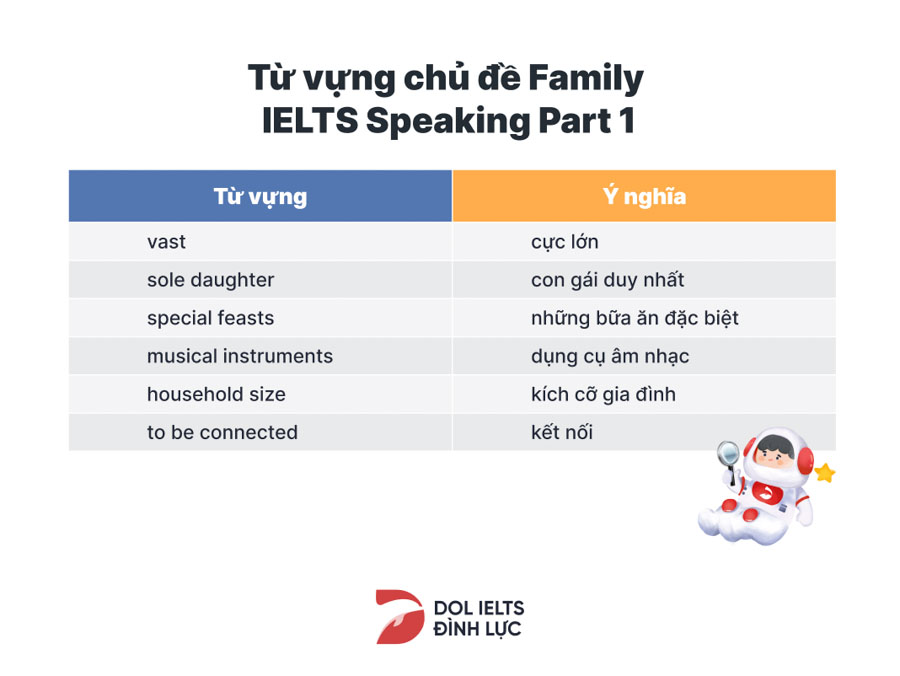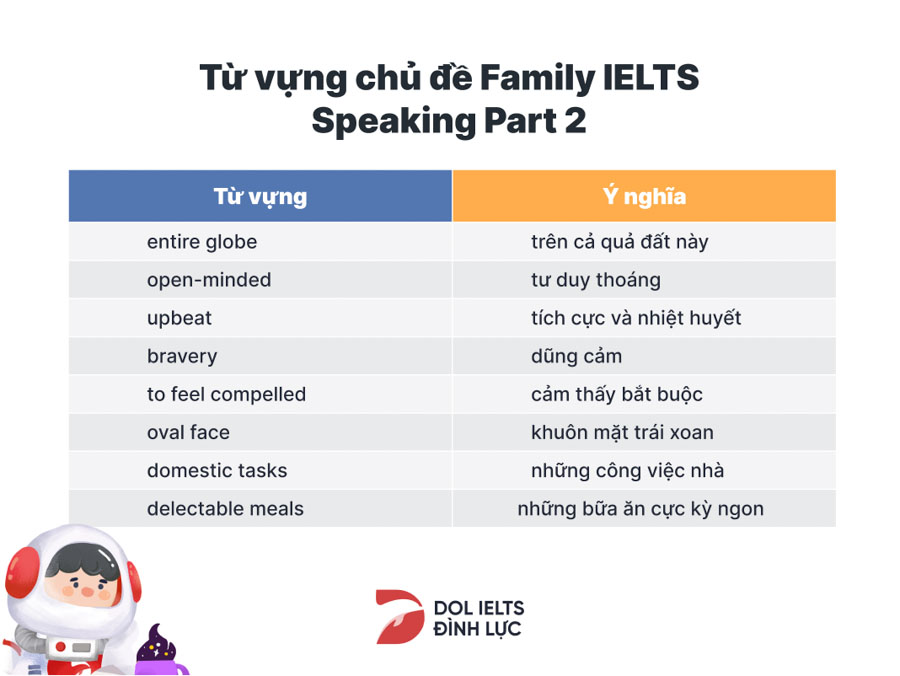Tổng hợp Từ Vựng Và bài mẫu IELTS speaking Topic Family Part 1,2,3
Để trả lời trôi chảy và mạch lạc, cũng như giải thích tình cảm của bạn về gia đình, bạn phải có vốn từ vựng tương đối, cấu trúc câu tốt và khả năng diễn đạt hiệu quả. Dol English có thể giúp bạn giải quyết 14 câu hỏi về chủ đề Family IELTS Speaking nhanh chóng và hiệu quả trong bài viết này.
DOL IELTS Đình Lực
Oct 27, 2022
2 mins read

Table of content
1. Từ vựng chủ đề family IELTS Speaking
1.1 Từ vựng mô tả những thành viên trong gia đình.
1.2 Từ vựng mô tả các “loại” gia đình.
1.3 Những từ vựng khác trong chủ đề gia đình.
2. Idioms chủ đề family IELTS Speaking
3. Bài mẫu chủ đề family IELTS Speaking part 1
3.1. Do you have a large or small family?
3.2. How much time do you spend with your family?
3.3. What do you like to do together as a family?
3.4. Do you get along well with your family?
3.5. Is yours a typical family?
3.6. Are there many different types of families in your country?
3.7. Who are you closest to in your family?
3.8. What is your special moment with your family?
4. Bài mẫu chủ đề family IELTS Speaking part 2
4.1 Describe the person in your family who you most admire
4.2 Describe a family member who has an important influence on you
5. Bài mẫu chủ đề family IELTS Speaking part 3
5.1 In what ways have families in your country changed in recent?
5.2 Should husbands and wives have different roles within the family? Why (not)?
5.3 Which are more important to you: your family or your friends?
5.4 What role do grandparents have in the family in your country?
6. Câu hỏi thường gặp
1. Từ vựng chủ đề family IELTS Speaking
1.1 Từ vựng mô tả những thành viên trong gia đình.
Husband: chồng
Wife: vợ
Siblings = brothers or sisters: anh chị em
Aunt: dì, cô, bác gái
Uncle: chú, cậu, bác trai .
Nephew: cháu trai (the son of someone’s brother or sister)
Niece: cháu gái (a daughter of someone’s brother or sister)
Cousin: anh em họ (a child of someone’s uncle or aunt)
Pouse: vợ/ chồng, người có quan hệ hôn nhân với người kia (a husband or wife, considered in relation to their partner)
Stepdaughter: con riêng của chồng/vợ
Stepmother: mẹ kế
Mother-in-law: mẹ chồng, mẹ vợ
Father-in-law: bố chồng, bố vợ
Relatives: họ hàng người thân
1.2 Từ vựng mô tả các “loại” gia đình.
Extended family: đại gia đình, bao gồm cả bố mẹ, con cái, ông bà và (có thể) cả cô chú, các bác…
Nuclear family: gia đình cơ bản (hay còn gọi là gia đình hạt nhân), bao gồm bố mẹ và con cái
Blended family: gia đình có thành phần bao gồm con riêng từ chồng hoặc vợ hoặc cả hai
1.3 Những từ vựng khác trong chủ đề gia đình.
To raise = to bring up: nuôi nấng đứa trẻ
Upbringing: sự dạy dỗ mà một đứa trẻ được nhận trong quá trình khôn lớn
Childhood: thời thơ ấu
Adolescence = teenage years = puberty : tuổi dậy thì
To divorce: ly dị
To marry: kết hôn, lập gia đình
Marriage: hôn nhân
Neglected: bị bỏ bê
To get on well with somebody: có mối quan hệ hòa thuận với ai đó
To take after somebody: có nét giống, tương đồng với ai đó
Overprotective: quá bảo vệ, bao bọc
Strict: nghiêm khắc, khắt khe
Foster family: gia đình nhận nuôi trẻ tạm thời
Family background: thông tin gia cảnh
Family gathering: buổi tụ họp của gia đình
To lead seperate lives: theo đuổi cuộc sống riêng
Family activity: hoạt động gia đình
Household chore: việc nhà
2. Idioms chủ đề family IELTS Speaking
Idiom | Meaning | Example |
Break one’s neck | Nai lưng ra làm, cố gắng hết sức. | My parents want us to try hard and use all our effort for studying. They break their neck to fulfill our requirements for life and education expenses. |
Bring home the bacon | Kiếm tiền nuôi sống gia đình | Now that I have a full-time job, I'm bringing home the bacon! |
Buckle down | Học hành nghiêm túc | My dad wants me to stop playing games and buckle down for my exams. |
The apple of one’s eyes | Người được cưng chiều, yêu mến | My 2-year-old little brother is the apple of my father’s eyes. He takes after my father a lot. |
Apple doesn’t fall far from tree | Con nhà tông không giống lông cũng giống cánh | He does so good at math, just like his father. You know that an apple doesn’t fall far from the tree. |
Men make houses; women make homes: E.g: | Đàn ông xây nhà, đàn bà xây tổ ấm. | Despite the traditional thought that men make houses and women make homes, nowadays in Vietnam, women are capable of earning money and doing big things as well. |
Black sheep of the family | Thành viên cá biệt của gia đình | Everyone likes me because I'm so quiet and obedient. The same cannot be said for my wild cousin Nathan, who is the black sheep of the family. |
Until the cow comes home | Khi đã về khuya, rất muộn | I regret what I have done in the past, hung out all day with bad guys and went home until the cow comes home. That made my parents worried a lot. |
Like two peas in the same pot | Giống nhau như đúc | The twins are like two peas in the same pot. I can hardly tell them apart. |
When the blood sheds, the heart aches | Máu chảy ruột mềm. | When the blood sheds, the heart aches. Everyone in the family has to take responsibility to stand by their side and help others to go through sorrow. |
Bang for the buck | Đáng đồng tiền bát gạo | When I had to prepare for my entrance exam to the university, my parents borrowed money from the bank to help me. After graduation, I get a job in a good company and my parents said it was the best bang for the buck they have ever made. |
Like father, like son | Giống hệt nhau | My dad and my brother are like father, like son. They match each other in every aspect. |
Air one’s dirty laundry in public | Vạch áo cho người xem lưng. | My mom acts so sensibly whenever I do something wrong. She never yells at me in front of people. She doesn’t want to air my dirty laundry in public. |
Blood is thicker than water
| Một giọt máu đào hơn ao nước lã. | You had better pay more attention to your family and relative than neighbors. Because blood is thicker than water. |
Turn gray | Bạc đầu. | My parents work so hard to raise the children that their hair turns grey over the time. |
Cách hiệu quả duy nhất để cải thiện giọng của bạn trong IELTS Speaking là không chỉ nghe các tài liệu đích thực (chẳng hạn như CNN hoặc BBC) mà còn bắt chước cách phát âm. Cố gắng tạo dáng cho đôi môi của bạn như người bản xứ. Quan sát ngôn ngữ cơ thể của họ. Nghe các bài hát tiếng Anh vì đó cũng là một cách tuyệt vời để tiến bộ hơn.
IELTS Examiner’s Tips An Academic Guide to IELTS Speaking and Writing (by Karolina Achirri)
3. Bài mẫu chủ đề family IELTS Speaking part 1
3.1. Do you have a large or small family?
My family is rather vast. I now have a father, a mother, an elder brother, and three younger brothers. As a result, I am now the family's sole daughter.
3.2. How much time do you spend with your family?
For the time being, I live alone in another city far from my family, therefore I can only spend around two weeks with them every year.
3.3. What do you like to do together as a family?
My family likes cooking together and then gathering for special feasts to which everyone is invited. We read the news and discussion our lives. We like music as well. As a result, when we get together, we play a variety of musical instruments and sing along.
3.4. Do you get along well with your family?
Sure. We have a great deal in common. I'm relieved that I can tell them anything. When I have an issue, they are always willing to listen.
3.5. Is yours a typical family?
So, to answer your question, yes, our family is average. A family that sticks together through good and terrible times.
3.6. Are there many different types of families in your country?
Yes, different sorts of families differ in terms of household size. Small families with one or two children exist alongside huge families with eight or more children. Parents may decide to adopt a child who has no relatives.
3.7. Who are you closest to in your family?
I am the most connected to my mother. I believe it is because we are the family's only females. So we agree on a lot of things, and she is always there for me.
3.8. What is your special moment with your family?
Celebrations are amazing, especially when they are for special events such as my birthday, my parent’s anniversary, or any great achievement by my siblings. These instances have many important memories for us, and we consider them to be our special moments.

4. Bài mẫu chủ đề family IELTS Speaking part 2
4.1 Describe the person in your family who you most admire
You should say:
what their relationship is to you
what they have done in their life
what they do now
and explain why you admire them so much.
My mother is the person I admire the most, not just in my family, but in the entire globe. She is an excellent wife and mother. She is lovely, compassionate, understanding, and open-minded. I like how she sees things. She is quite upbeat.
I admire her bravery in parenting me and my brothers. She tried her hardest to be a great mother and was always there for us. My mother left her job a few years and her motivation was to spend more time with the family, especially as we grew older. She felt compelled to do so.
4.2 Describe a family member who has an important influence on you
You should say:
who is the person?
how long have you known him/her?
what qualities this person has and explain why this person has had such an influence on you?
I'd want to speak about my mother, who is without a doubt the most important person I've ever encountered. It's been 27 years since I first saw her when I opened my eyes to this planet. My mother is now in her sixties, yet she still looks young.
Her hair is medium-length, and she has an oval face. The thing that stands out the most is her continual smile. In terms of personality, she is a really sensitive and kind-hearted person who gets along with everyone.
She is constantly accountable for all she does, including domestic tasks and kid care. For example, she frequently cooks delectable meals for me and stands by me. She is the most generous individual I have ever encountered.
She impacted me much in thinking about others because she frequently undertakes unpaid volunteer work to serve the local community. As a retired teacher, she offered evening sessions to youngsters from low-income families in my neighborhood.
Aside from that, Mom frequently encouraged me when I was angry or having problems in life. I recall her telling me once that it didn't matter what happened as long as I tried. As a result, I wish I could inherit some of my mother's wonderful qualities.
Finally, I adore Mom with all of my heart and am honored to be her daughter.

5. Bài mẫu chủ đề family IELTS Speaking part 3
5.1 In what ways have families in your country changed in recent?
In recent years, the roles of husbands and spouses have shifted. Both partners have been more willing to take on new responsibilities, such as taking advantage of other career possibilities or becoming more active in the family.
Another shift, I believe, is the tendency toward having fewer children. Because of the high cost of living and employment opportunities, parents often consider having smaller families.
5.2 Should husbands and wives have different roles within the family? Why (not)?
Traditionally, husbands and wives had distinct social duties. Husbands worked to provide for the family's financial requirements, while wives were supposed to care for the home.
Over time, changes happened, and both husbands and wives began to participate in each of these responsibilities. This is a wonderful shift in my opinion.
It is not required to describe each position precisely. Whatever role family members play, I believe they should constantly strive to do what is best for the family as a whole.
5.3 Which are more important to you: your family or your friends?
Both are significant, but my family occupies a special position in my life. Friends may come and go, but I know that no matter what happens in my life or what decisions I make, my family will always be there for me.
Nonetheless, my friends are the closest individuals to whom I can share and discuss matters that are not always proper to talk about in the family circle.
5.4 What role do grandparents have in the family in your country?
Being a grandparent is considered to be like being a parent twice over, and I believe that applies to the eldest members of most Vietnamese households.
Despite certain modifications, the majority of Vietnamese homes continue to follow the three-generation model, with grandparents playing an important role as co-caregivers.
For example, they could care for the children while the parents are at work. Plus, grandparents may provide complete moral support to all other family members.

Xem thêm:Describe a coffee shop IELTS part 1
6. Câu hỏi thường gặp
Gợi ý những chủ đề hay thường gặp trong phần thi IELTS Academic Writing
What to know about pets and COVID-19
How will COVID-19 change life
Pros and cons of self-isolation
How optimism influences your immunity
Using a bicycle instead of a car improves your health and lowers your environmental impact
Does social media improve people’s communication skills?
Are people who went to college more successful?
Do people abuse their right to carry guns?
Does police brutality have a racial aspect?
Should recycling be compulsory?
Is competition really beneficial?
Những tài liệu luyện thi IELTS Academic Writing nào thí sinh nên tham khảo?
Cambridge IELTS Test Books
New Scientist
BBC News
Live Science
National Geographic
Other ‘science’ sites
World History Encyclopedia
The Independent
The Economist
Learner sites
Cách để viết lời giới thiệu hay trong phần thi IELTS Academic Writing?
Trước tiên, thí sinh cần phân tích kỹ câu hỏi để có thể hiểu và trả lời đúng trọng tâm vấn đề.
Trong lời mở đầu, thí sinh cần khái quát chung vấn đề, đồng thời chưa cần nói quá sâu vào nội dung câu hỏi (phần này thường đưa vào thân bài).
Sử dụng ngữ điệu khi viết mang tính cá nhân hoá của thí sinh để tạo dấu ấn riêng.
Đề cập sơ qua đến hướng mà thí sinh định phát triển bài luận của mình.
Và tất nhiên, cần đảm bảo rằng bạn đã viết đúng chính tả cũng như ngữ pháp.
Những từ vựng thường được sử dụng trong phần thi IELTS Academic Writing là gì?
Chủ đề Environment: + Carbon dioxide ≈ greenhouse gases (khí thải nhà kính) ≈ emissions (khí thải) + The greenhouse effect: hiệu ứng nhà kính + Average global temperatures ≈ the earth’s average temperatures ≈ our planet’s average temperatures: nhiệt độ trung bình toàn cầu/trái đất + Human activity: hoạt động của con người + Deforestation ≈ forest clearance ≈ illegal logging (chặt cây trái pháp luật) ≈ cutting and burning trees + Produce = release + khí thải + into….(v): thải khí thải ra đâu + The burning of fossil fuels: việc đốt nhiên liệu hóa thạch + Ozone layer depletion: sự phá hủy tầng ô-zôn + Melting of the polar ice caps: việc tan chảy các tảng băng ở cực + Sea levels: mực nước biển + Extreme weather conditions: những điều kiện thời tiết khắc nghiệt + Put heavy pressure on…: đặt áp lực nặng nề lên… + Wildlife habitats: môi trường sống của động vật hoang dã + The extinction of many species of animals and plants: sự tuyệt chủng của nhiều loài động thực vật + People’s health: sức khỏe của con người + Introduce laws to…: ban hành luật để…. + Raise public awareness: nâng cao ý thức cộng đồng
Chủ đề Education: + Separate schools = single-sex schools/education = single-gender schools/education: trường 1 giới + Mixed schools = mixed-sex schools/education = mixed-gender schools/education = integrated schools/education = co-ed schools/education: trường 2 giới + Send sb to….: đưa ai đó tới đâu + Study at ….school = e..school = enter…education =choose…school: học tại đâu + There is little chance for: hầu như không có cơ hội cho… + Early relationships: việc nảy sinh tình cảm sớm + Concentrate on = focus on: tập trung vào… + Get higher academic results: đạt được kết quả học tập cao + Have the opportunity to: có cơ hội làm gì + Interact and take part in group work activities: tương tác và tham gia vào các hoạt động nhóm + Opposite-sex classmates: bạn khác giới + Learn a wide range of skills: học được các kỹ năng khác nhau + Communication or teamwork skills: kỹ năng giao tiếp hay làm việc nhóm + Co-existence and gender equality: sự cùng tồn tại và sự bình đẳng giới + Explore each other’s perspectives, their similarities and differences: khám phá sự khác nhau/giống nhau và quan điểm của người khác
Chủ đề Health: + Excessive consumption of…: việc tiêu thụ quá mức… + Sedentary lifestyles: lối sống thụ động + Fast food – junk food (đồ ăn vặt) – pre-made food (thức ăn được chuẩn bị sẵn) + Have a healthy diet = have a balanced diet: có 1 chế độ ăn lành mạnh, cân bằng + Have an unhealthy diet = have an imbalanced diet: có 1 chế độ ăn không lành mạnh, không cân bằng + Take part in = participate in = engage in: tham gia vào + Rapid weight gain: sự tăng cân nhanh chóng + Weight problems: các vấn đề về cân nặng + Obesity (n): sự béo phì + Obese(adj): béo phì + Child obesity = childhood obesity = obesity among
children: béo phì ở trẻ em + Take regular exercise: tập thể dục thường xuyên + Physical activity: hoạt động thể chất + Make healthier food choices: lựa chọn thực phẩm lành mạnh hơn
Chủ đề Crime: + Commit a crime = commit an offence = break the law: thực hiện hành vi phạm tội + Reoffend = commit crimes again: tái phạm + Criminals = offenders = lawbreakers = people who commit crimes: kẻ phạm tội + Engage in criminal activities = take part in unlawful acts: tham gia vào các hoạt động phạm pháp + Minor crimes such as shoplifting or pickpocketing: các tội nhẹ như ăn trộm vặt tại các cửa hàng hay móc túi + Serious crimes such as robbery or murder: các tội nặng như cướp hay ám sát + Receive capital punishment = receive the death penalty: nhận án tử hình + Receive prison sentences = be sent to prison: nhận án tù/ bị bỏ tù + Life imprisonment: tù chung thân + Impose stricter punishments on…: áp đặt những hình phạt nặng nề hơn lên… + Provide education and vocational training: cung cấp giáo dục và đào tạo nghề + Commit crimes as a way of making a living: phạm tội như 1 cách để kiếm sống + To be released from prison: được thả/ ra tù + Rehabilitation programmes: những chương trình cải tạo + Pose a serious threat to society: gây ra mối đe dọa nghiêm trọng cho xã hội
Vậy là DOL đã hoàn thành phần tổng hợp từ vựng, câu hỏi và cấu trúc trả lời mẫu cho phần chủ đề “family” IELTS Speaking cho cả 3 phần bài thi trong phần thi nói.
Mong rằng bài viết này đã giúp các bạn tích luỹ được những từ vựng hay và “bỏ túi” được nhiều cách diễn đạt nâng cao khi trả lời câu hỏi trong phòng thi.
Nếu các bạn có thắc mắc gì liên quan đến việc cải thiện tiếng Anh bản thân và nâng band điểm IELTS cho mục đích cá nhân trong tương lai, hãy đừng ngại ngần liên hệ DOL English để được tư vấn trình độ tiếng Anh bản thân miễn phí và tư vấn lộ trình học thích hợp nhất với bản thân nhanh thôi nào.
Table of content
1. Từ vựng chủ đề family IELTS Speaking
1.1 Từ vựng mô tả những thành viên trong gia đình.
1.2 Từ vựng mô tả các “loại” gia đình.
1.3 Những từ vựng khác trong chủ đề gia đình.
2. Idioms chủ đề family IELTS Speaking
3. Bài mẫu chủ đề family IELTS Speaking part 1
3.1. Do you have a large or small family?
3.2. How much time do you spend with your family?
3.3. What do you like to do together as a family?
3.4. Do you get along well with your family?
3.5. Is yours a typical family?
3.6. Are there many different types of families in your country?
3.7. Who are you closest to in your family?
3.8. What is your special moment with your family?
4. Bài mẫu chủ đề family IELTS Speaking part 2
4.1 Describe the person in your family who you most admire
4.2 Describe a family member who has an important influence on you
5. Bài mẫu chủ đề family IELTS Speaking part 3
5.1 In what ways have families in your country changed in recent?
5.2 Should husbands and wives have different roles within the family? Why (not)?
5.3 Which are more important to you: your family or your friends?
5.4 What role do grandparents have in the family in your country?
6. Câu hỏi thường gặp

